NIL
James Franklin Wants to Be a ‘Transformational’ Coach
James Franklin’s body of work in college football crosses an important line of demarcation in the sport. The Penn State football coach played and coached in Division III football as the launch pad to a career in a game that wasn’t yet a business. Now, Franklin coaches in a business built around a game, to […]

James Franklin’s body of work in college football crosses an important line of demarcation in the sport. The Penn State football coach played and coached in Division III football as the launch pad to a career in a game that wasn’t yet a business. Now, Franklin coaches in a business built around a game, to which he’s constantly trying to adapt without losing sight of his purpose.
“I think the majority of people got into coaching college football, in my generation, to be transformational on young people’s lives” Franklin said recently. “None of us, my age or older, got into this business because of money. It was because you love the game of football and you wanted to help young people grow and mature. I worry a little bit now that, because of how the sport has changed, there’s people being attracted to the sport for the wrong reasons.”
Entering his 12th season at Penn State, and 15th season as a head coach, Franklin has developed into a pragmatic voice of the game. He addresses college football’s questions and inconsistenies with firm boundaries but a measured hand. Franklin talks about revenue sharing, the transfer portal, conference scheduling, NIL, roster limitations and every other debate point about the game through a common lens. Franklin wants college football to be transformational in a transactional world.
The recent House vs. NCAA settlement means that, beginning July 1, Penn State and other athletic departments can begin paying players directly for the first time. Penn State will fund revenue sharing for football to the maximum. It’s only practical for a national championship contender.
Penn State and Franklin recruit with revenue sharing and NIL in mind, sometimes top of mind, and are willing to pay for talent. Yet Franklin also wants money to be part of a package, not the focus, in playing at Penn State.
“The way the sport has changed from a transfer portal perspective and from an NIL perspective, I think there’s also young people and families that are making decisions based on a transactional experience rather than a transformational experience,” Franklin said. “So for us, we’re one of a handful of programs that are still holding on to [wanting] it to be as transformational an experience as possible. I think that aligns with Penn State and what our values are and how we want this program to be run. That’s something that was always very important to me.”
Certainly, Penn State football has traded in being transformational for decades through “Success With Honor.” However, Franklin also must understand modern college football, which believes that funding programs also can be “transformational.” At Penn State, the balancing act is more complex.
“It was also very obvious to me coming to Penn State that that was very important to our alumni and very important to this community and very important to our lettermen,” Franklin said. “So we are fighting, scratching, clawing to balance those two things. There’s an aspect that you have to embrace the evolution of college football. But you don’t have to abort what your values are and and how you still want it to go. And I think there’s a way that you can really blend the both, so that the kid, the family, the program, the university … can still really provide a similar experience that we always have.”
More Penn State Football
NIL
Crackdown on NIL Collectives Might Reshape the College Sports Scene
Crackdown on NIL Collectives Could Reshape College Sports Landscape A new enforcement agency in college sports has drawn a firm line regarding the regulation of name, image, and likeness (NIL) payments to athletes — a move that could dismantle how many school-affiliated collectives currently operate. On Thursday, the College Sports Commission (CSC) issued new guidance […]

Crackdown on NIL Collectives Could Reshape College Sports Landscape
A new enforcement agency in college sports has drawn a firm line regarding the regulation of name, image, and likeness (NIL) payments to athletes — a move that could dismantle how many school-affiliated collectives currently operate.
On Thursday, the College Sports Commission (CSC) issued new guidance that significantly narrows what qualifies as a “valid business purpose” for NIL deals. The announcement came just days after the $2.8 billion House v. NCAA settlement took effect on July 1, establishing a clearinghouse called NIL Go to review third-party deals exceeding $600.
The goal is to prevent schools from circumventing the new $20.5 million revenue-sharing cap by routing funds through booster-backed collectives.
According to the CSC, any entity whose primary function is paying athletes — rather than offering legitimate goods or services to the public — fails to meet NIL Go’s standards. This includes collectives that host events or sell merchandise primarily to fund player payments. Even if these events are open to the public or involve promotional efforts, the CSC says they still don’t qualify.
“For somebody to just slide you a few dollars because they want you to come or stay at a certain school and call it NIL — that’s make-believe,” Purdue Athletic Director Mike Bobinski said in an interview with NBC Sports.
The ruling has sent shockwaves through the NIL ecosystem. In the four years since NIL deals became legal, school-affiliated collectives have funneled hundreds of millions of dollars into athlete compensation — often functioning as unofficial arms of athletic departments. These groups have paid athletes for appearances, endorsements, and social media promotions. But with the CSC now rejecting most of these deals, that model appears to be collapsing.
A memo sent to Division I athletic directors clarified the new standard: agreements with collectives primarily created to pay athletes or benefit specific schools will no longer be approved. While external NIL deals are still allowed, they must be with companies offering real products or services to the general public and must reflect fair market value.
The backlash was immediate. The Collective Association, which represents NIL collectives nationwide, called the CSC’s interpretation “misguided,” arguing it ignores both legal precedent and the economic realities of college athletics. The group claimed collectives are essential to athlete support and are being unfairly targeted.
Adding to the frustration, collective leaders like Dalton K. Forsythe of Utah State’s Blue A Collective reported widespread rejections of submitted NIL deals. “Nearly 100 percent of collective-backed NIL deals are being denied,” Forsythe posted on X, citing inconsistent standards and poor communication from NIL Go.
In response, some top programs are already adjusting. Collectives affiliated with Colorado, Alabama, Notre Dame, Georgia, and others have announced shutdowns. Meanwhile, schools like Ohio State, Georgia, and Illinois are partnering with Learfield — a long-established media and licensing firm — to ensure NIL deals comply with the new rules.
Despite the chaos, NIL Go has approved over 1,500 deals since launching in June, ranging in value from hundreds to millions of dollars. More than 12,000 athletes and 1,100 institutions are already registered. However, most approved transactions have involved athletes and legitimate businesses — not donor collectives.
Ultimately, the CSC has made clear that the future of NIL lies in traditional sponsorships and commercial endorsements, not donor-funded payouts. Whether courts will uphold these rules — or whether athletes will challenge them on antitrust grounds — remains to be seen. For now, though, the days of collectives writing large checks behind the scenes may be coming to an end.
NIL Crackdown Could Shake Up the Mountain West Conference
The College Sports Commission’s new enforcement guidance is expected to significantly impact the Mountain West Conference (MWC), where many schools have relied on donor-driven collectives to remain competitive in a rapidly evolving landscape.
With the July 1 implementation of the House v. NCAA settlement and the launch of NIL Go, third-party deals over $600 now require approval and must meet strict new standards. At the core is a simple requirement: NIL deals must have a “valid business purpose” and reflect “fair market value.” This change effectively invalidates many of the collective-based agreements MWC schools have used to attract and retain talent.
Why It Matters in the MWC
Unlike Power Five schools with massive alumni networks, national brand recognition, and lucrative TV deals, Mountain West programs have depended heavily on local businesses and booster collectives for NIL funding. These groups have helped schools compete for transfer portal athletes or retain breakout stars vulnerable to poaching.
That strategy is now at risk.
According to the CSC’s latest memo, any NIL deal where a collective pays an athlete merely for attending an event or helping promote merchandise — a common practice among MWC collectives — no longer meets the “valid business purpose” threshold. The Commission argues these transactions are not tied to legitimate commercial activity but instead serve as disguised payments, making them clear violations under the new rules.
Potential Fallout for Mountain West Schools
This shift could hit programs like Boise State, Fresno State, San Diego State, and Utah State particularly hard. These schools have developed strong football reputations but lack the deep financial backing of Big Ten or SEC institutions.
- Boise State has relied on a passionate fan base and collective support to maintain its status as a Group of Five powerhouse. Without that funding source, Boise could fall behind in the NIL arms race.
- Utah State’s Blue A Collective is already feeling the pressure. Director Dalton Forsythe reports that nearly all of their NIL submissions are being rejected under the new rules, calling the standards “unclear and unrealistic.”
- Fresno State and San Diego State have used competitive NIL offers to retain local talent, but that ability may diminish without collective-based funding, making it harder to keep players from transferring out.
Shifting the Strategy
With collective-led NIL deals under fire, Mountain West programs will need to shift toward compliant, athlete-to-business partnerships. But that transition won’t be easy. Local businesses in MWC markets often lack the advertising budgets or incentive to sign athletes without school involvement.
Some Power Five schools have already moved to fill this gap by partnering with companies like Learfield to streamline compliant NIL opportunities. Mountain West institutions may need to follow suit, though doing so with fewer resources will be a steep challenge.
The Bigger Picture
This shake-up may further widen the gap between Power Five and Group of Five programs. Although the House settlement allows schools to compensate athletes up to $20.5 million annually directly, most MWC institutions don’t have the budget flexibility to fully utilize that cap.
Mountain West Commissioner Gloria Nevarez said the league is considering implementing a revenue-sharing minimum starting in the 2025-26 season. If approved, the plan would ensure at least a baseline level of NIL funding across the conference. However, lingering legal issues over departing members and the lack of a finalized media rights deal leave much uncertain.
Nevarez emphasized that protecting competitive balance is critical, especially as NIL compensation becomes central to recruiting.
Without collectives as a workaround, the Mountain West risks becoming a feeder league, developing top talent only to watch it transfer to schools offering better NIL opportunities.
In short, unless national rules shift again — or MWC schools find new, sustainable NIL models — the league’s ability to compete at a national level could suffer dramatically under this new NIL landscape.
As everything in the NCAA college sports scene, you just don’t know what a day will bring. It’s like this big NCAA college soap opera from a fan’s perspective.
As the NIL landscape undergoes its most dramatic shift yet, the Mountain West Conference finds itself at a crossroads.
The new rules may level the playing field in theory, but in practice, they risk sidelining programs that have used creativity and community support to stay relevant.
With traditional collectives on the chopping block and commercial partnerships harder to come by in smaller markets, MWC schools must now adapt quickly—or risk falling further behind in a system increasingly tilted toward the power conferences.
The next chapter in college athletics will be defined not just by talent on the field, but by who can navigate the off-field rules best.
NIL
CBS Sports ranks Big 12 Football head coaches’ seats from hottest to coolest
Fresh off of Big 12 Media Days in Frisco, Tex., CBS Sports has ranked Big 12 football head coaches’ seats from hottest to coolest. Unlike other conferences, however, there aren’t many contenders in the conference to truly be on the hot seat. Consistent play and new hires litter the Big 12. That means a change […]

Fresh off of Big 12 Media Days in Frisco, Tex., CBS Sports has ranked Big 12 football head coaches’ seats from hottest to coolest. Unlike other conferences, however, there aren’t many contenders in the conference to truly be on the hot seat.
Consistent play and new hires litter the Big 12. That means a change in leadership following this upcoming season would be a little surprising, to say the least. Here are CBS Sports’ rankings from 1-16:
After 20 seasons in Stillwater, Mike Gundy‘s tenure at Oklahoma State could be coming to an end. This would be a huge change for the program.
“After a prolific playing career and leading the program to 169 victories as a head coach, Gundy is Oklahoma State football,” Athlon Sports wrote in its recent College Football Preview magazine for the 2025 season. “But after last year’s 3-9 record and reworked contract that included a pay cut, it’s clear that Gundy is under some pressure.”
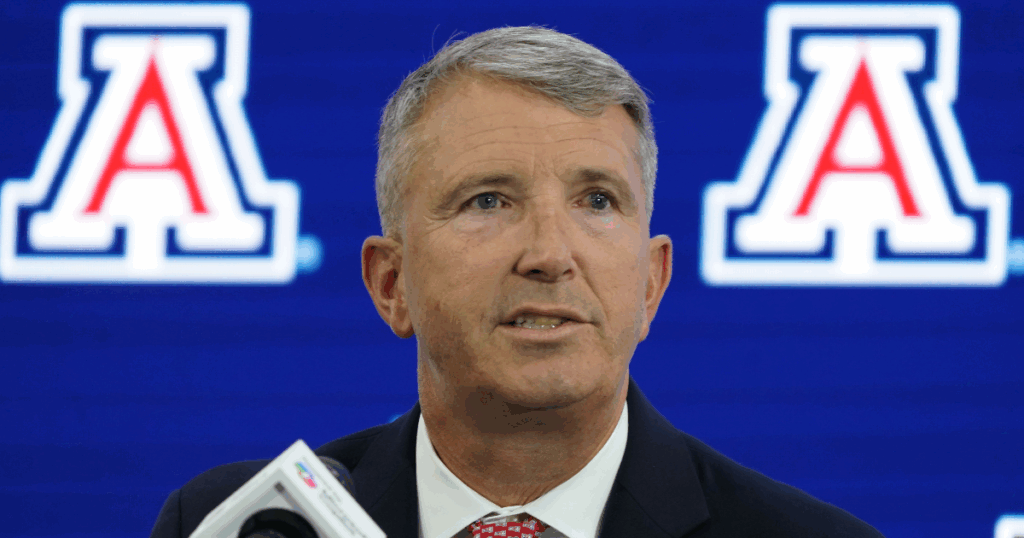
After just one season, Arizona‘s Brent Brennan is on the hot seat. Brennan, who made the jump from San Jose State to Arizona prior to its 2024 campaign, led the Wildcats to a lowly 4-8 record. Its eight losses came by an average of 23.9 points per game.
“Brennan inherited a roster capable of contending for the Big 12 title,” Athlon Sports wrote. “Instead, the Wildcats regressed to 4-8, with six losses by 20 points or more. Add in a new athletic director who didn’t hire Brennan, and it’s clear that the second-year coach needs to show marked improvement.”
Cincinnati is entering year three of the Scott Satterfield era and things still look like a mess. The Bearcats are just 8-16 (4-14) over his first two seasons, a far cry from when they made the College Football Playoff in 2021.
“Satterfield was a surprising hire for Cincinnati following a 17-19 record in his final three years at Louisville,” Athlon Sports wrote. “Through two seasons, Satterfield has struggled to find his footing with an 8-16 mark.”
Three seasons removed from taking TCU to the College Football Playoff National Championship Game, Sonny Dykes could be hanging on the hot seat. Following that 13-2 season, the Horned Frogs are just 14-11 over the past two years.
“It’s crazy to say this about a team who played in the national championship, but this is the season that really matters when it comes to Sonny,” an anonymous Big 12 coach told Athlon Sports. “They built depth and recruited to fill every deficiency on that five-win team. Now what? They have the best signing classes in the league, and that matters because they’re also building NIL to keep the kids they want.”
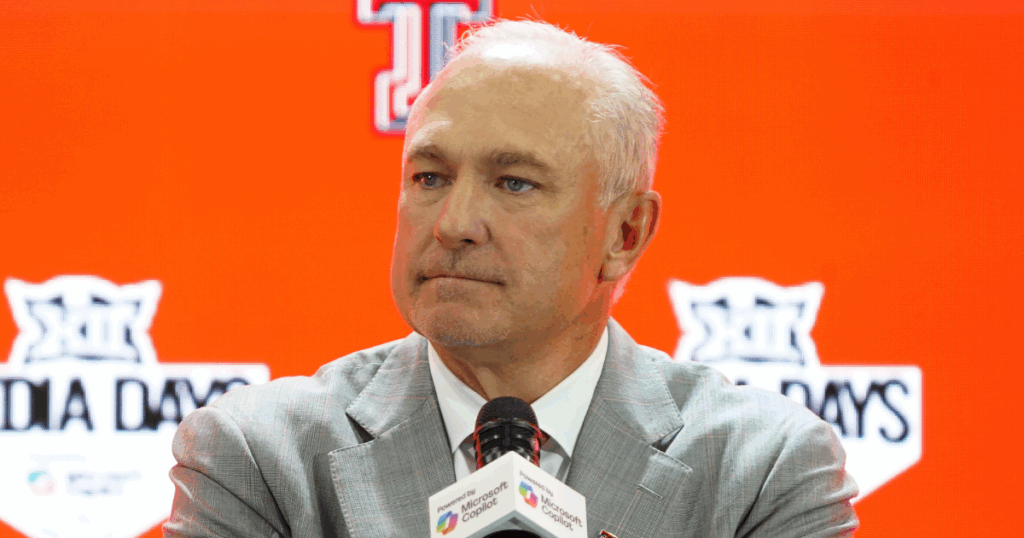
Joey McGuire‘s first three seasons have been consistent, as the Red Raiders have won at least seven games in all three years, along with two bowl victories. However, if McGuire doesn’t take Texas Tech to that next level this season, his seat could get a little warm.
“If they’re not a double-digit win team this season, it will be considered a failure,” an anonymous Big 12 coach told Athlon Sports. “It’s hard to know if that’s fair, or if spending like this is a smart long-term strategy.”
Dave Aranda and Baylor broke through in his second season at the helm (2021), winning 12 games and the Big 12 Championship. Since then, however, the Bears are just 17-21.
With a strong returning cast, led by quarterback Sawyer Robertson, another disappointing season could turn heads amongst the suits in Waco. The Bears look to avoid that being the case.
Nos. 7-16
7. Scott Frost, UCF Knights (19-7)
8. Rich Rodriguez, West Virginia Mountaineers (60-26)
9. Willie Fritz, Houston Cougars (4-8)
10. Kalani Sitake, BYU Cougars (72-43)
11. Lance Leipold, Kansas Jayhawks (22-28)
12. Chris Klieman, Kansas State Wildcats (48-28)
13. Kyle Whittingham, Utah Utes (167-86)
14. Matt Campbell, Iowa State Cyclones (64-51)
15. Deion Sanders, Colorado Buffaloes (13-12)
16. Kenny Dillingham, Arizona State Sun Devils (14-12)
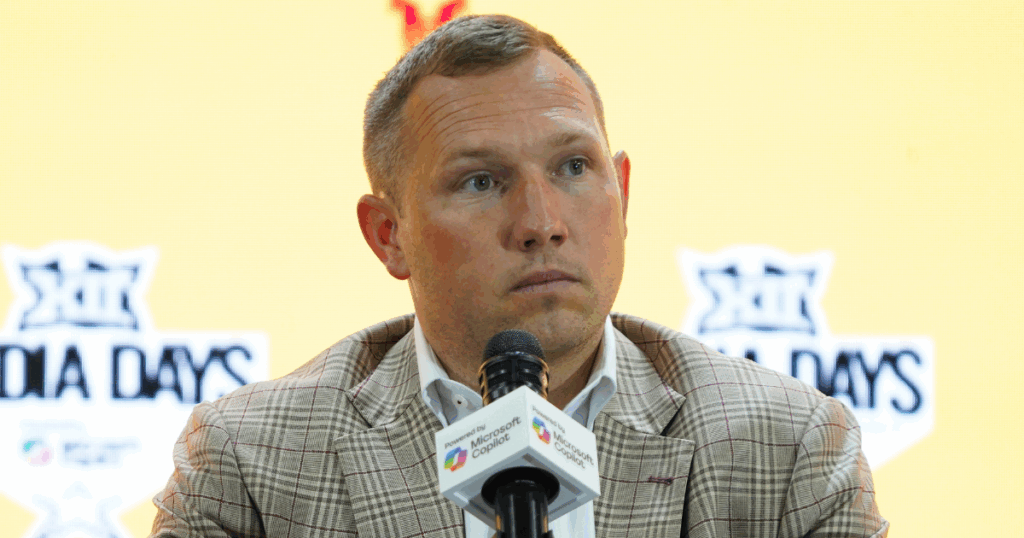
NIL
Federal lawmakers propose regulation for college NIL
MONTGOMERY, Ala. (WSFA) – Federal lawmakers are pushing to bring nationwide consistency to how college athletes profit from their name, image, and likeness — commonly known as NIL. Rep. Shomari Figures, who represents Alabama’s 2nd Congressional District, introduced a bill in Congress this week aimed at creating clear national standards for student-athlete compensation, naming it […]

MONTGOMERY, Ala. (WSFA) – Federal lawmakers are pushing to bring nationwide consistency to how college athletes profit from their name, image, and likeness — commonly known as NIL.
Rep. Shomari Figures, who represents Alabama’s 2nd Congressional District, introduced a bill in Congress this week aimed at creating clear national standards for student-athlete compensation, naming it the Student Compensation and Opportunity through Rights and Endorsements (SCORE) Act.
“The environment and the landscape of college athletics have changed drastically over the past several years, especially since the Supreme Court decision that came out,” Figures said. “There was a huge need here to stabilize what was going on.”
The SCORE Act extends beyond paychecks. It includes provisions for career development, comprehensive medical care, and protections for athletes who are injured — efforts that Figures said are crucial to long-term success both on and off the field.
“Making sure that student-athletes are not just prepared to participate on the field or the court, but making sure they are there at the end of the day to receive degrees,” Figures said.
The bill also aims to level the playing field for colleges and universities nationwide, ensuring every athletic program operates under the same set of rules.
“It removes this landscape of what some have referred to as the Wild, Wild West of NIL,” Figures said. “It brings everything under … some very straightforward guidelines.”
The proposal has drawn bipartisan support. Sen. Tommy Tuberville, a former college football coach, said smaller schools have been at a disadvantage in the current NIL environment.
“There are some teams that can’t afford to do that,” Tuberville said. “We want to make it fair for everybody.”
Figures said the bill is still a work in progress, but he remains optimistic.
“We’re hopeful to see some progress here,” he said. “There will still be some changes, some things that have to be further discussed. We want this bill to be the strongest it can be to provide the best protections for our student-athletes.”
Not reading this story on the WSFA News App? Get news alerts FASTER and FREE in the Apple App Store and the Google Play Store!
Copyright 2025 WSFA. All rights reserved.
NIL
Federal lawmakers propose regulation for college NIL
MONTGOMERY, Ala. (WSFA) – Federal lawmakers are pushing to bring nationwide consistency to how college athletes profit from their name, image, and likeness — commonly known as NIL. Rep. Shomari Figures, who represents Alabama’s 2nd Congressional District, introduced a bill in Congress this week aimed at creating clear national standards for student-athlete compensation, naming it […]

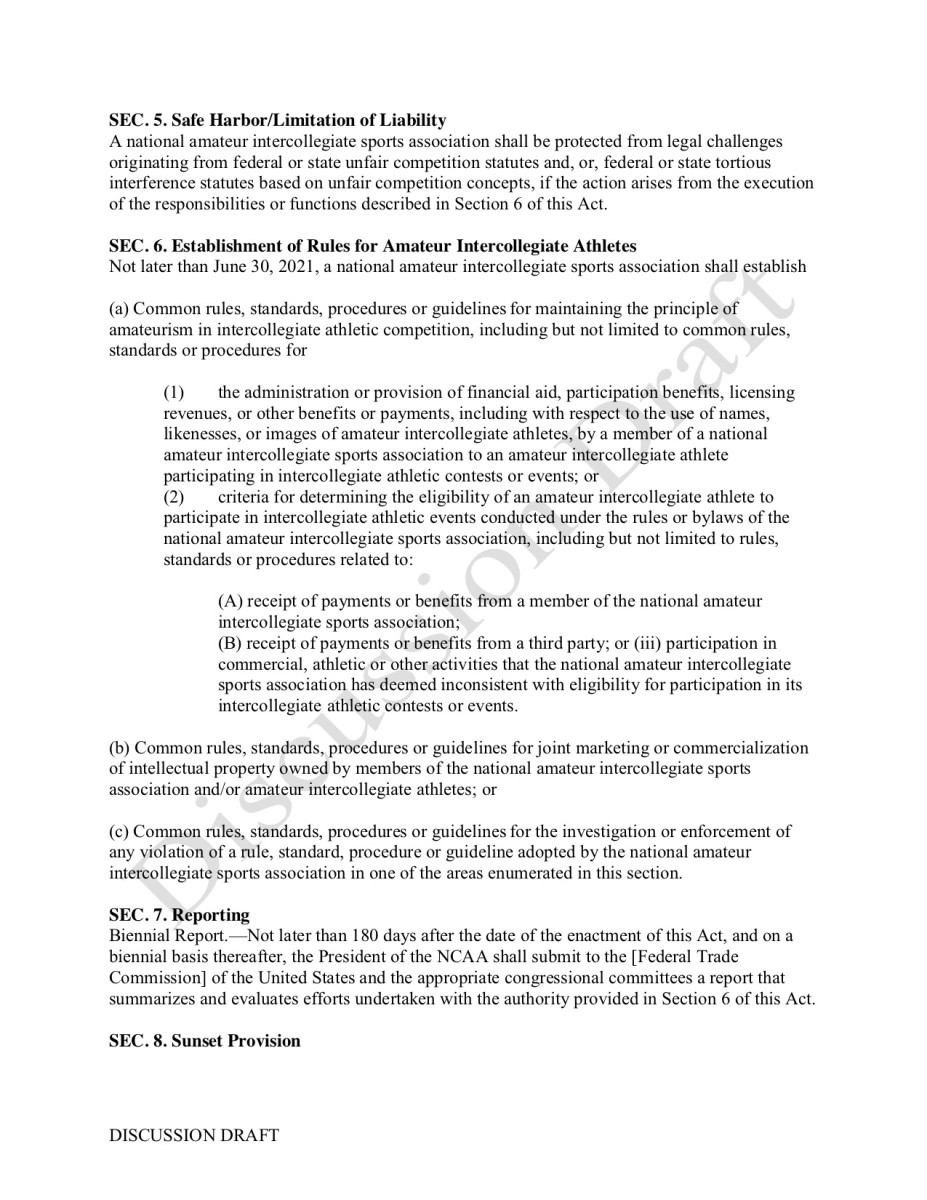
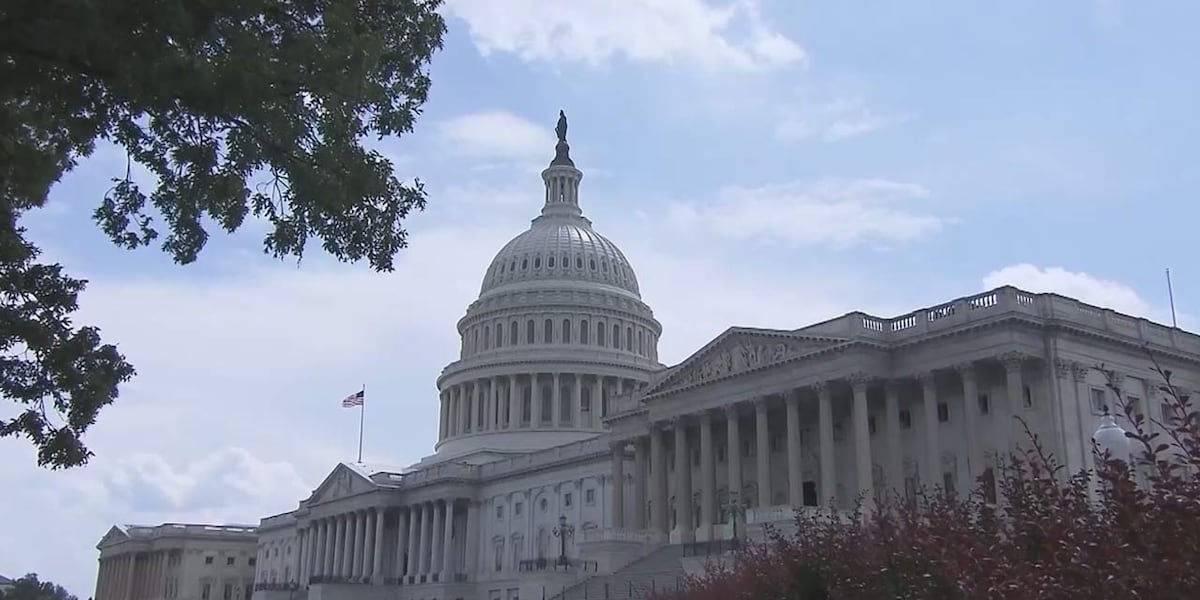
MONTGOMERY, Ala. (WSFA) – Federal lawmakers are pushing to bring nationwide consistency to how college athletes profit from their name, image, and likeness — commonly known as NIL.
Rep. Shomari Figures, who represents Alabama’s 2nd Congressional District, introduced a bill in Congress this week aimed at creating clear national standards for student-athlete compensation, naming it the Student Compensation and Opportunity through Rights and Endorsements (SCORE) Act.
“The environment and the landscape of college athletics have changed drastically over the past several years, especially since the Supreme Court decision that came out,” Figures said. “There was a huge need here to stabilize what was going on.”
The SCORE Act extends beyond paychecks. It includes provisions for career development, comprehensive medical care, and protections for athletes who are injured — efforts that Figures said are crucial to long-term success both on and off the field.
“Making sure that student-athletes are not just prepared to participate on the field or the court, but making sure they are there at the end of the day to receive degrees,” Figures said.
The bill also aims to level the playing field for colleges and universities nationwide, ensuring every athletic program operates under the same set of rules.
“It removes this landscape of what some have referred to as the Wild, Wild West of NIL,” Figures said. “It brings everything under … some very straightforward guidelines.”
The proposal has drawn bipartisan support. Sen. Tommy Tuberville, a former college football coach, said smaller schools have been at a disadvantage in the current NIL environment.
“There are some teams that can’t afford to do that,” Tuberville said. “We want to make it fair for everybody.”
Figures said the bill is still a work in progress, but he remains optimistic.
“We’re hopeful to see some progress here,” he said. “There will still be some changes, some things that have to be further discussed. We want this bill to be the strongest it can be to provide the best protections for our student-athletes.”
Not reading this story on the WSFA News App? Get news alerts FASTER and FREE in the Apple App Store and the Google Play Store!
Copyright 2025 WSFA. All rights reserved.
NIL
New agency rejecting some NIL deals with donor
The new agency in charge of regulating name, image, likeness deals in college sports sent a letter to schools Thursday saying it had rejected deals between players and donor-backed collectives formed over the past several years to funnel money to athletes or their schools. × This page requires Javascript. Javascript is required for you to […]


The new agency in charge of regulating name, image, likeness deals in college sports sent a letter to schools Thursday saying it had rejected deals between players and donor-backed collectives formed over the past several years to funnel money to athletes or their schools.
NIL
College football analyst drops Miller Moss bombshell that hints at ACC Title run
Louisville football is beginning to become the nation’s dark horse to win the 2025 ACC Title. While Clemson and Miami are getting all the hype and praise, Jeff Brohm and his Cardinals have been flying under the radar until now. With the 2025 season quickly approaching, media outlets, college football analysts, and reporters are beginning […]
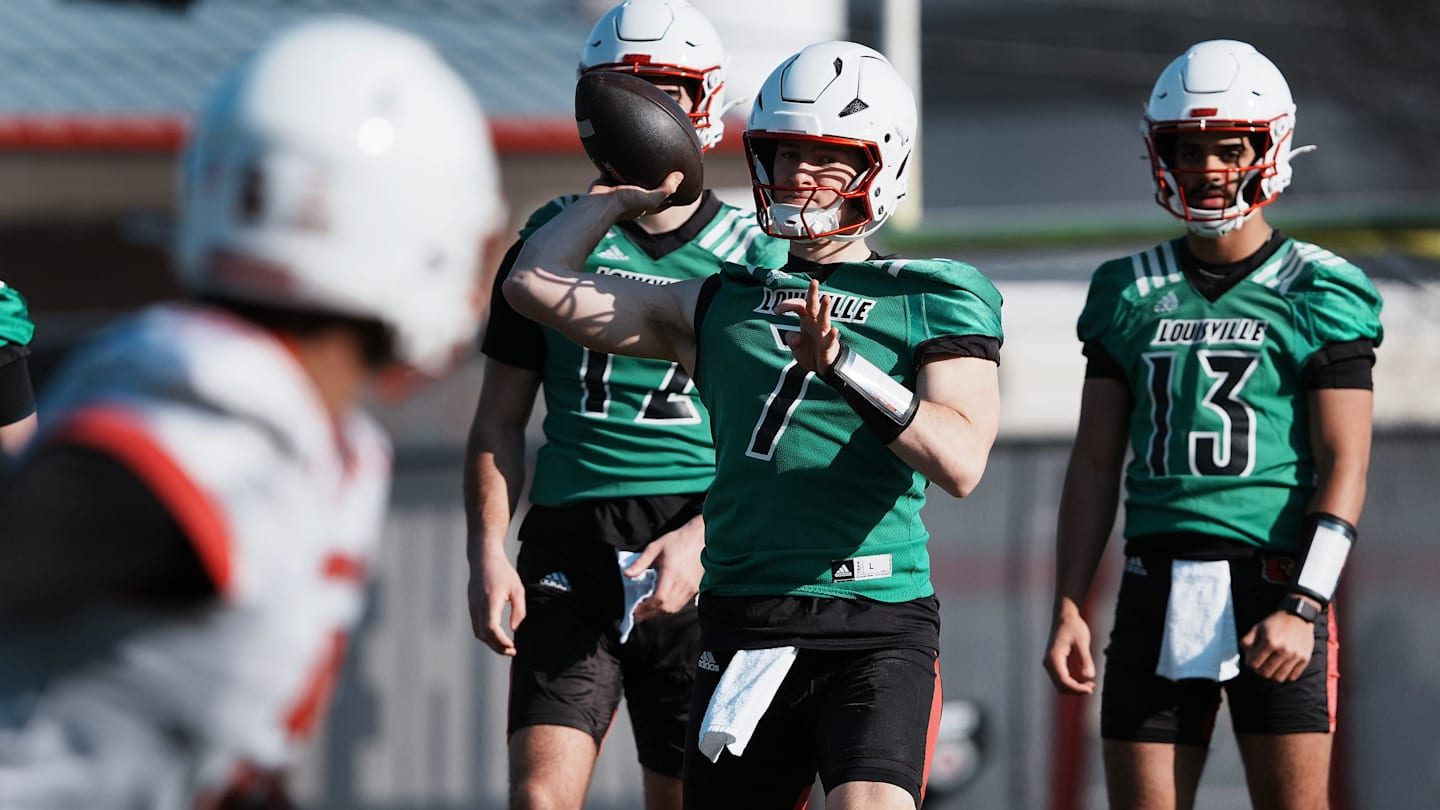
Louisville football is beginning to become the nation’s dark horse to win the 2025 ACC Title. While Clemson and Miami are getting all the hype and praise, Jeff Brohm and his Cardinals have been flying under the radar until now.
With the 2025 season quickly approaching, media outlets, college football analysts, and reporters are beginning to bring up the Cardinals’ squad. Everyone is starting to realize just how elite of a head coach Brohm is, and even though they travel to Miami and SMU, they have a favorable schedule.
The newest college football reporter to praise the Cardinals is David Pollack, a former ESPN analyst and member of College Gameday. The analyst didn’t just praise Brohm, but also commended their transfer portal additions, key returners, and their schedule, and even went on air to say they will return to the ACC Title game on his latest podcast.
Related: Louisville football’s superstar makes the Walter Camp pre-season All America team
Louisville football’s Miller Moss get high praise from David Pollack
Brohm is emerging as one of the best coaches in the nation. He recently made the Dodds Trophy Award Watch List, and with his stacked offense and key returners on defense, Pollack has valid points to think that Louisville has what it takes to contend for their first ACC Title.
The analyst was asked who the best transfer would be in the ACC, and in his buildup to pick Miller Moss over Miami’s Carson Beck, it was the best hype speech Louisville might have ever received.
““This is easy to me. I think Beck is going to kill it, but if you’re watching college football, and if you’ve watched Louisville and if you’ve watched Jeff Brohm, he’s a freaking superstar. The way he coaches the game. The way he feels the game. The way he can use misdirection. The way he can use pro-style concepts with spread concepts. Take any quarterback, and I mean any quarterback, I think he could win with any quarterback in this league. And, I just think, with him, with their running back who’s on my fantasy team, I think is going to absolutely destroy it.””
David Pollack
He then went on to pick the Cardinals’ incoming transfer from USC over Beck, who is regarded as one of the top quarterbacks in the nation. Picking Moss over Beck is quite a hot take, but it shouldn’t be one. Moss with Brohm’s offense and style of play should give Louisville a clear path to an ACC Title, and Pollack agrees.
“Miller Moss also showed me some swag last year, man, Pollack stated. “Like, he showed me, because he got the shiznik kicked out of him. That dude got absolutely destroyed. That offensive line was very un-good for. I think Miller Moss is going to come in and absolutely tear it up at Louisville.”
The Cardinals are turning into a top quarterback university and one for the underdogs. They aren’t bringing in 5-star or top 10 quarterbacks, but are bringing in quarterbacks whose programs have given up and thrown in the towel.
Everyone is familiar with Beck and what he brings. The potential of Moss with Brown, Caullin Lacy, and Chris Bell, along with Brohm, has fans and apparently Pollack extremely excited. This offense is stacked, and it has breakout potential. They have some tough games on their schedule, but if Brohm can develop Moss like he did with Tyler Shough, then this team has the chance to return to Charlotte.
Related: ESPN unveils ‘season-defining game’ that will make or break Louisville football’s season
For all the latest on Louisville football’s offseason and recruiting, stay tuned.
-

 Technology2 weeks ago
Technology2 weeks agoPet fitness and wellness trends for a healthier and happier dog
-

 College Sports2 weeks ago
College Sports2 weeks agoWAC to Rebrand to UAC, Add Five New Members in 2026
-

 Motorsports2 weeks ago
Motorsports2 weeks agoWhy Cosmetics are Making Up for Lost Time in Women’s Sports
-

 Professional Sports3 weeks ago
Professional Sports3 weeks agoFrancis Ngannou sends Dana White a message following Jon Jones' shock UFC retirement
-

 College Sports2 weeks ago
College Sports2 weeks agoA new era of Dickinson hockey begins behind the bench – The Dickinson Press
-

 Health2 weeks ago
Health2 weeks agoFlorida assault survivor shares hope for change with new mental health law
-
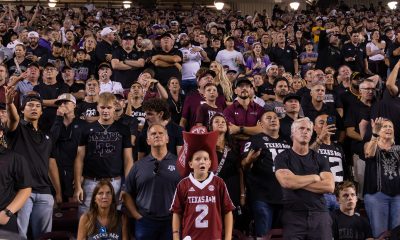
 Sports3 weeks ago
Sports3 weeks agoSEC Conference imposing a fine will create the opposite effect.
-

 Motorsports2 weeks ago
Motorsports2 weeks agoNASCAR This Week – Patriot Publishing LLC
-
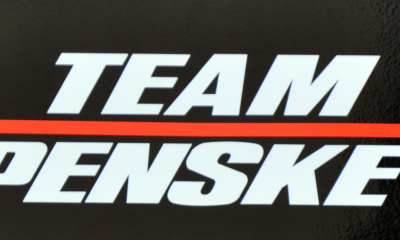
 Motorsports1 week ago
Motorsports1 week agoTeam Penske names new leadership
-

 Youtube3 weeks ago
Youtube3 weeks agoFunniest MLB rain delay moments


















 | Get Up
| Get Up














